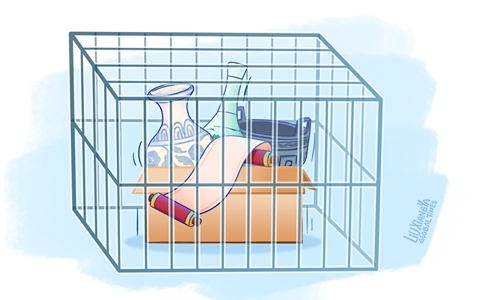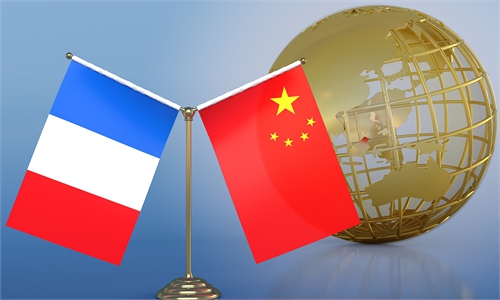ARTS / CULTURE & LEISURE
Japan must return looted Chinese relics

Illustration: Liu Xiangya/GT
China, with its many centuries of high civilization, vast area and large population, may be the richest source of ancient cultural relics in the world. These cultural relics, with their tremendous amount and enormous variety, are the priceless treasuries of the Chinese people and part of the roots of the Chinese nation.
Unfortunately, since the mid-19th century, a huge number of cultural relics have been flowing beyond the Chinese border illicitly through looting, smuggling, and other illegal means. It should be emphasized that during the War of Resistance against Japanese Aggression (1931-45), Japanese troops ravaged and looted countless historic relics in China, causing a catastrophic and irremediable loss to China's cultural heritage.
Now, 79 years have passed since the Japanese surrender in World War II; nevertheless, Japan has not returned these plundered cultural relics to China. Although the return of cultural relics looted by colonialist countries has become a subject of international concern in recent years and some former colonial powers are mulling returning some looted objects taken from African countries, the restitution of looted Chinese cultural relics by Japan has not yet attracted the significant attention of the international community.
Even in China, demands for Japan to return looted Chinese relics have not captured enough attention. The Chinese government, public and academia are primarily focused on the restitution of plundered or illegally removed artifacts in Western museums or those put up for auction by major international auction houses, such as Christie's and Sotheby's.
Currently, more than 2 million Chinese artifacts are held in Japanese museums across the country, including the Japanese Imperial Palace, Tokyo Museum of Science and Tokyo Imperial University. Most of these artifacts were looted from China during wartime. The Tokyo National Museum, in particular, is displaying around 10,000 Chinese cultural objects that were plundered from China. Among these, 11 items are designated as "Japanese national treasures" and 147 items as "important cultural property."
In August, the Global Times published an editorial demanding that all cultural property illegally acquired from China should be immediately returned, which attracted high attention both at home and abroad. In fact, the influence of this editorial was so significant that the American Society of International Law also took notice of this call and included "China's Looted Cultural Property: Historical Injustice and Current Dilemma" as one of the main themes of its 2024 Annual Meeting held in Washington DC.
As an invited participant, I attended the forum and engaged in in-depth discussions with foreign counterparts. Needless to say, it was significant that the restitution of looted Chinese cultural property has eventually become a focal point of Western academic attention. However, there is still a long way to go before looted Chinese relics can be returned.
At present, both international law and the domestic law of other countries pose serious challenges for China and other countries seeking restitution of their stolen cultural property. The practical effect of the three most relevant conventions adopted after World War II regarding the restitution and return of cultural properties to their original nation is limited. These conventions are: the Convention for the Protection of Cultural Property in the Event of Armed Conflict of 1954, the Convention on the Means of Prohibiting and Preventing the Illicit Import, Export and Transfer of Ownership of Cultural Property of 1970, and the Convention on Stolen or Illegally Exported Cultural Objects of 1995. Despite their importance, they are of little use for China when requesting Japan to return Chinese artifacts looted during wartime, as they do not have a retroactive effect.
On the domestic level, there are legal obstacles as well. Countries that have accumulated looted and stolen treasures have laws and legal institutions, such as limitations and extinctive prescriptions, which could undermine claims for the restitution of looted relics. Moreover, major countries have enacted laws to prevent the return of looted cultural treasures housed in public museums to their countries of origin.
Given the multiple legal obstacles, it is not difficult to understand why China has not submitted formal requests to Japan for the return of looted relics, and countries like Greece and Egypt have not succeeded in getting their cultural treasures back despite their best efforts.
Nonetheless, this does not mean that Japan is immune from returning cultural property looted from China. On the contrary, the demand for the return of cultural property looted during the Japanese invasion and occupation is an inalienable right of the Chinese people enshrined in both international law, ethics and morality in international relations that Japan cannot ignore or evade.
First of all, the Hague Conventions of 1899 and 1907 contain prohibitions on the looting of cultural property. Moreover, the rules in the above conventions are widely recognized as customary international law, which are, therefore, legally binding for all countries. It follows that looting cultural property in China by the invading Japanese forces violated international law.
Second, the UN General Assembly has unanimously adopted numerous resolutions on the return or restitution of cultural property to countries of origin since the second half of the 20th century to the present day. The UN resolutions, despite their lack of legally binding effects, reflect the consensus of the international community and provide strong moral and ethical support for the countries of origin to seek restitution of their looted and illicitly trafficked cultural property from the countries that currently possess them.
Third, the return of Chinese relics looted by Japan during the War of Resistance against Japanese Aggression is imperative to maintaining the postwar international order. The war was a part of the allies' war against fascism, and in fact was the beginning of World War II in the Asia-Pacific region. During the 14 years of the War of Resistance against Japanese Aggression, the invading Japanese forces committed appalling atrocities in China, including pillaging, rape, slaughter, destruction, and the plunder of cultural treasures. Those plundered Chinese artifacts are the treasure of Chinese people, and solid evidence of the war crimes committed by the Japanese invaders. Consequently, demanding Japan return these plundered artifacts represents China's efforts to advance accountability for war crimes committed by Japan in the War of Resistance against Japanese Aggression and to seek justice after World War II.
Some Japanese scholars argue that China has waived its rights to ask Japan to return plundered cultural property because the Chinese government renounced its demand for war reparations from Japan in the 1972 Sino-Japanese Joint Statement. Nevertheless, it should be emphasized that this argument does not hold water. Under international law, war reparations are payments by a defeated country to compensate the winning countries for some of their war costs, as a punitive measure as well as to compensate for economic losses. In comparison, asking the invading country to return cultural property plundered from the invaded country after the end of war is a claim to the restoration of property to its rightful owner, which is a demand to right the wrongs committed by the invaders, not a punitive measure or compensation for economic losses. Therefore, the renouncement of war reparations from Japan by the Chinese government does not and should not mean that China has waived its rights to ask Japan to return plundered cultural property.
The year 2025 will mark the 80th anniversary of the end of the World War II, and China will be commemorating the 80th anniversary of victory in the War of Resistance against Japanese Aggression that year.
Against this background, it is high time for China to formally request Japan to return Chinese cultural property looted during wartime and to refrain from adopting a resistant, protracted and perfunctory attitude.
Returning those plundered treasures to China is a legal and ethical obligation that Japan cannot ignore or evade and will gain wide international support.
As a law professor, I have always had a deep-seated belief in law and justice. As the saying goes, "Justice may be delayed, but it will not be denied."
The author is a professor of law at China University of Political Science and Law and a vice chairperson of the China Society of Private International Law. life@globaltimes.com.cn



